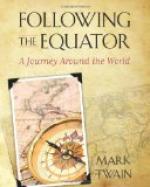CHAPTER XXII.
Nothing is so ignorant as a man’s left hand, except a lady’s watch.
—Pudd’nhead Wilson’s New Calendar.
You notice that Mrs. Praed knows her art. She can place a thing before you so that you can see it. She is not alone in that. Australia is fertile in writers whose books are faithful mirrors of the life of the country and of its history. The materials were surprisingly rich, both in quality and in mass, and Marcus Clarke, Ralph Boldrewood, Cordon, Kendall, and the others, have built out of them a brilliant and vigorous literature, and one which must endure. Materials—there is no end to them! Why, a literature might be made out of the aboriginal all by himself, his character and ways are so freckled with varieties—varieties not staled by familiarity, but new to us. You do not need to invent any picturesquenesses; whatever you want in that line he can furnish you; and they will not be fancies and doubtful, but realities and authentic. In his history, as preserved by the white man’s official records, he is everything—everything that a human creature can be. He covers the entire ground. He is a coward—there are a thousand fact to prove it. He is brave—there are a thousand facts to prove it. He is treacherous —oh, beyond imagination! he is faithful, loyal, true—the white man’s records supply you with a harvest of instances of it that are noble, worshipful, and pathetically beautiful. He kills the starving stranger who comes begging for food and shelter there is proof of it. He succors, and feeds, and guides to safety, to-day, the lost stranger who fired on him only yesterday—there is proof of it. He takes his reluctant bride by force, he courts her with a club, then loves her faithfully through a long life—it is of record. He gathers to himself another wife by the same processes, beats and bangs her as a daily diversion, and by and by lays down his life in defending her from some outside harm—it is of record. He will face a hundred hostiles to rescue one of his children, and will kill another of his children because the family is large enough without it. His delicate stomach turns, at certain details of the white man’s food; but he likes over-ripe fish, and brazed dog, and cat, and rat, and will eat his own uncle with relish. He is a sociable animal, yet he turns aside and hides behind his shield when his mother-in-law goes by. He is childishly afraid of ghosts and other trivialities that menace his soul, but dread of physical pain is a weakness which he is not acquainted with. He knows all the great and many of the little constellations, and has names for them; he has a symbol-writing by means of which he can convey messages far and wide among the tribes; he has a correct eye for form and expression, and draws a good picture; he can track a fugitive by delicate traces which the white man’s eye cannot discern, and by methods




